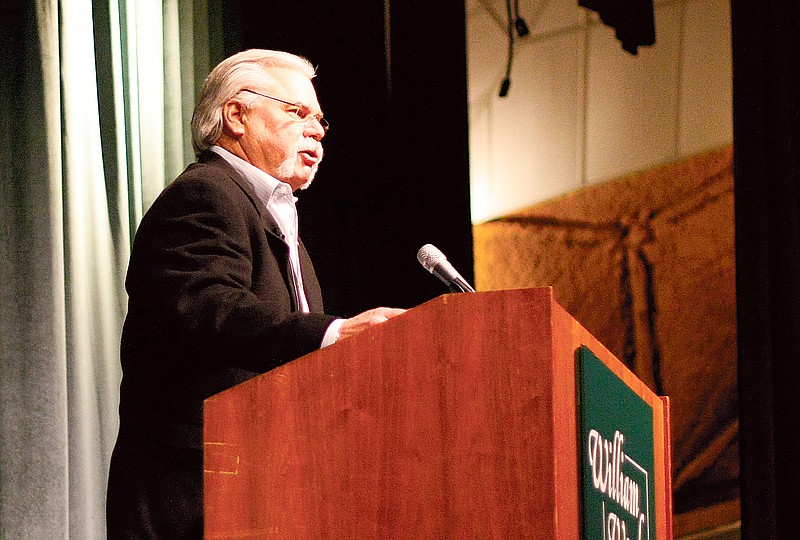While his arm made Al Hrabosky one of the most effective relievers in Major League Baseball in the "70s, his on-diamond antics and Fu Manchu mustache helped make him famous. He quit playing baseball in 1983, but finds his life still at the ballpark announcing broadcasts for the St. Louis Cardinals.
On Tuesday, while one of the most famous speeches in the nation was taking place, Hrabosky was giving a speech of his own - to students at William Woods University and local community members.
"I think this is my opportunity to lecture young men and women who are the age of my daughters," Hrabosky said before he spoke to the crowd at the podium.
The former St. Louis Cardinal and Kansas City Royal talked about his life experiences during the lecture, which was part of the President's Concert and Lecture Series.
"In many ways, I was lost at different times," he said. "I had an outlet through sports, but yet, even through that, I was able to play professional baseball for 15 years, but in my mid-30s, that career was over. You don't just die so you gotta go on. I think there are parallels. Just because I was an athlete doesn't mean other people can't relate to my experiences."
He expressed concern about current events.
"In the world today, I'm a little bit concerned about what's going on and I have great faith in the youth of America," he said. "But I think in many ways their tasks will be a lot more difficult than (my generation's) were."
Hrabosky used anecdotal evidence in his speech to teach the importance of faith and respect.
"When I started playing baseball, I was in Double-A ball making $800 a month, and we only played for five months," he said. "I was called up to the major leagues for the great amount of $2,000 a month, and we played for six months. But it wasn't about the money. It was about playing baseball."
Hrabosky started his athletic career playing football. He did not play little league baseball or high school baseball for two years. His senior year, he started pitching for his high school team, and went to a league similar to the American Legion baseball league in California.
"Out of high school, I was drafted by the Minnesota Twins," he said. "But they didn't offer me much money so I decided to go to college."
He was drafted two years later by St. Louis - a town in which he would spend much of his adult life working, both as a baseball player and now as an announcer for Fox Sports Cardinals broadcasts.
"The first day I put on a uniform as a professional baseball player I knew I could make it in the major leagues," he said. "My teammates were two or three years older than me and they had been playing for a couple of years. They were professional baseball players, but I knew I was going to be a Major League Baseball player."
Hrabosky learned a lot about self discipline in that first year.
"We had these running drills," he said. "There were no coaches standing over us, but we were supposed to sprint in the outfield from foul line to foul line. I was on my last sprint, and I knew that I was losing my balance. My body was ahead of my legs and I was scurrying to catch up to my body. I could see the foul line ahead of me and all my teammates were watching me. I decided that instead of falling on my face, I would launch over the foul line so I finished my sprint. My teammates looked at me like I was crazy, but I finished."
His position helped teach him about challenging himself - a lesson he wanted to teach the students in attendance.
"The biggest lesson that I was taught by a great teammate - Bob Gibson - one of the greatest competitors I ever played with - taught me not to make excuses. Accept consequences," he said. "If you do everything mentally and physically the way you prepare, you accept the consequences. If you get him out, you gotta get the next strike. If he pops it up and you get him out, you still have to get two more outs. You still have to get out of the inning. If he gets a base hit, and you did everything you wanted to do, don't worry about it. Just go back and use that as something you can do better next time.
"But you have got to go out there and challenge yourself on a daily basis. That was one thing I really loved. When you are talking to a coach, you have got to accept consequences. No one wants to hear an excuse - my arm is tired, I've pitched three days in a row. You have a responsibility."

